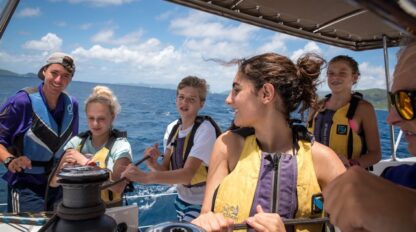Understanding Fragile Reefs
It is important to understand that all the reefs we have or will explore are extremely fragile. The things we do each day take their toll on our surroundings so we try to learn how we can change our environment, and what actions we can take to lessen our impact. It’s tricky business trying to determine if a recent worldwide decline of healthy coral reefs is the result of man-made interference. Or perhaps it’s part of a regular cycle of natural events in tropical water of which we were not previously aware? Divers and scientists around the world began to notice coral bleaching and subsequent coral deaths in the early 1980s. This coincided with an increase in tourism to tropical locations. As a result more snorkelers and divers came in contact with the reef, more sewage entered the water, and construction and development increased along with pollution. These factors might lead us to conclude that reef damage is in fact caused by man.
In 1982-83 the El Nino Southern Oscillation (ENSO) was particularly strong and drastically changed seal level and wind directions in the Pacific, especially around the equator. It is difficult to document a connection, but the timing of reef deterioration leads many scientists to believe on exists. Damage to coral reefs is related to changes in salinity, water temperature, pollution and large loads of suspended materials. In the Caribbean, these changes seem to stem more from human impacts than from climatic impacts. Many potentially begun to destroy them. Without long term records and observations of coral bleaching and its relationship to temperatures and pollution we don’t have evidence to make connections between cause and effect. We need time to make observations, people willing to study reefs, and education and awareness in the general public.
Reefs play a vital role in protecting fragile coastal systems from extensive wave damage. For humans, reefs potentially hold many medicines and healing properties. Coral is already used in surgery where bones need strengthening and repair. Sponges are used for an array of pharmaceuticals. Algae is used as a food source by eastern and western cultures.. If you brush your teeth with toothpaste, use lip balm, eat ice cream, milkshakes, or jell-o, then you have eaten and used algae (it’s listed as the ingredient carrageenen). Diving or snorkeling on a reef can be a dramatic experience for people. Being exposed to an element so different from our own routine has an incalculable effect. Reefs are also so invaluable for their educational value. And of course it goes without saying that they variance of life forms on the reef is vital for genetic diversity. Without richness of species, life forms are more prone to extinction when environmental conditions change.
It may seem that the impacts on reefs are too great to counter, but that is not at all the case. As we learn how our actions affect the marine ecosystems, we also learn what steps we can take to lessen our impact. Education and a change in bad habits our our long-term goals. By enrolling in a PADI Peak Performance Buoyancy course you can enhance your own personal reef preservation skills by becoming a “neutral” diver, one who has no impact, either positive or negative. In the PADI Photography or Videography specialties you can learn new ways to enjoy all underwater ecosystems without causing any damage. Learn to live by the motto “take only pictures, leave only bubbles”!! Likewise, participation in underwater cleanup or reef restoration projects in your area will make a difference. Support Project Aware by hosting an underwater clean-up of your own and get your community involved in the effort to preserve the oceans.








